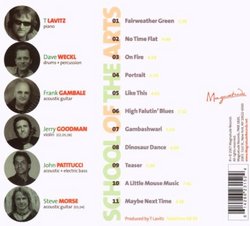Product DescriptionT Lavitz - Piano;
Frank Gambale - Acoustic Guitar;
Steve Morse - Acoustic Guitar;
Jerry Goodman - Violin;
John Patitucci - Acoustic and Electric Bass ;
Dave Weckl - Drums and Percussion
Cutting-edge compositions, beautiful sinuous melodies, and massive chops make School of the Arts (SOTA) a truly rare confluence of influences and musical styles, pushing jazz and jazz-fusion into another dimension.
The brainchild of keyboardist extraordinaire T Lavitz (Dixie Dregs, Jazz Is Dead), SOTA culls the supreme talents of such fusion and progressive instrumental music heavyweights as drummer Dave Weckl (Chick Corea) bassist John Patitucci (Corea, Herbie Hancock, Wayne Shorter), guitarist Frank Gambale (Corea, Vital Information), electric violinist Jerry Goodman of Mahavishnu Orchestra, Shadowfax, and Dixie Dregs fame, and T s longtime friend, Dregs mastermind, and Magna Carta label mate, monster axeman Steve Morse.
School of the Arts is different from every album I ve ever done as a leader, says Lavitz
With SOTA, Lavitz (with four decades experience in the music biz having played with such wide-ranging musicians as Widespread Panic, Bill Bruford, Billy Cobham, Nils Lofgren, Pat Benatar, Jefferson Starship, Mother s Finest, Dave Fiuczynski, Peter Himmelman, Dennis Chambers, Jeff Berlin, and Scott Henderson) is top dog, playing acoustic piano (an instrument close to his heart), and composing most of the material for the band s debut.
Underscoring Lavitz s empathy and musical instincts, is the keyboardist s ability to spearhead and hold together the SOTA project, despite each member s busy schedule: Morse is constantly touring with Deep Purple (occasionally with the Dregs); Jerry Goodman is an in-demand electric violin trailblazer; Patitucci and Weckl crisscross the globe with various artists and solo work; and likewise for Gambale, who recently finished a tour with Billy Cobham.
The music is definitely interactive, Lavitz says. When I take a solo, there s Frank Gambale answering me, like something you d hear on a gig.
Case in point: the Afro-Latin acoustic jazz tune Gambashwari. Sinewy guitar and piano chords/notes weave around one another in syncopated patterns, stating main, contra and counterpoint melodies. It s breezy, not cheesy, jazz -- the kind that possesses sophistication without being elitist, boring or unlistenable. It s utterly infectious jazz-fusion with aspirations toward chamber or classical music, with rock s reckless abandon simmering just under the surface.
Other tracks include, High Falutin Blues (an appropriate title for a song that crosses the boundaries of country, blues, and jazz), Like This (listen as Weckl locks into Patitucci s sparse bass line all the while commenting on Goodman s and T s jazzy/bluegrass-esque soloing acrobatics), and Teaser (a Chick Corea-style acoustic rocker, complete with trill-filled piano performances, blanketed by Weckl s silky stream of beats). Dave Weckl laid down some of the best drum tracks I ve heard in a while, Lavitz says.
Despite the obvious and some might say inevitable chops heard on this record, the high level of musicianship never detracts from the overall flow of the compositions. In fact, the record has a ring of newfound freedom; of a songwriter allowed to spread his compositional wings, which recalls the artistic creativity and motivation that drove Lavitz to create his 1986 solo debut, Storytime an album produced in the wake of a Dregs breakup. I am very excited about this, because not only did I get to write the bulk of the music, but I produced, played and played only acoustic, says Lavitz. While it has elements from other recordings I've done, it seems, at least to me, to stand out as being very different.


 Track Listings (11) - Disc #1
Track Listings (11) - Disc #1